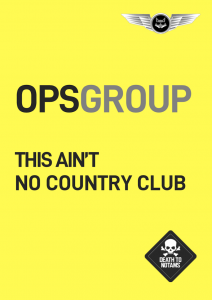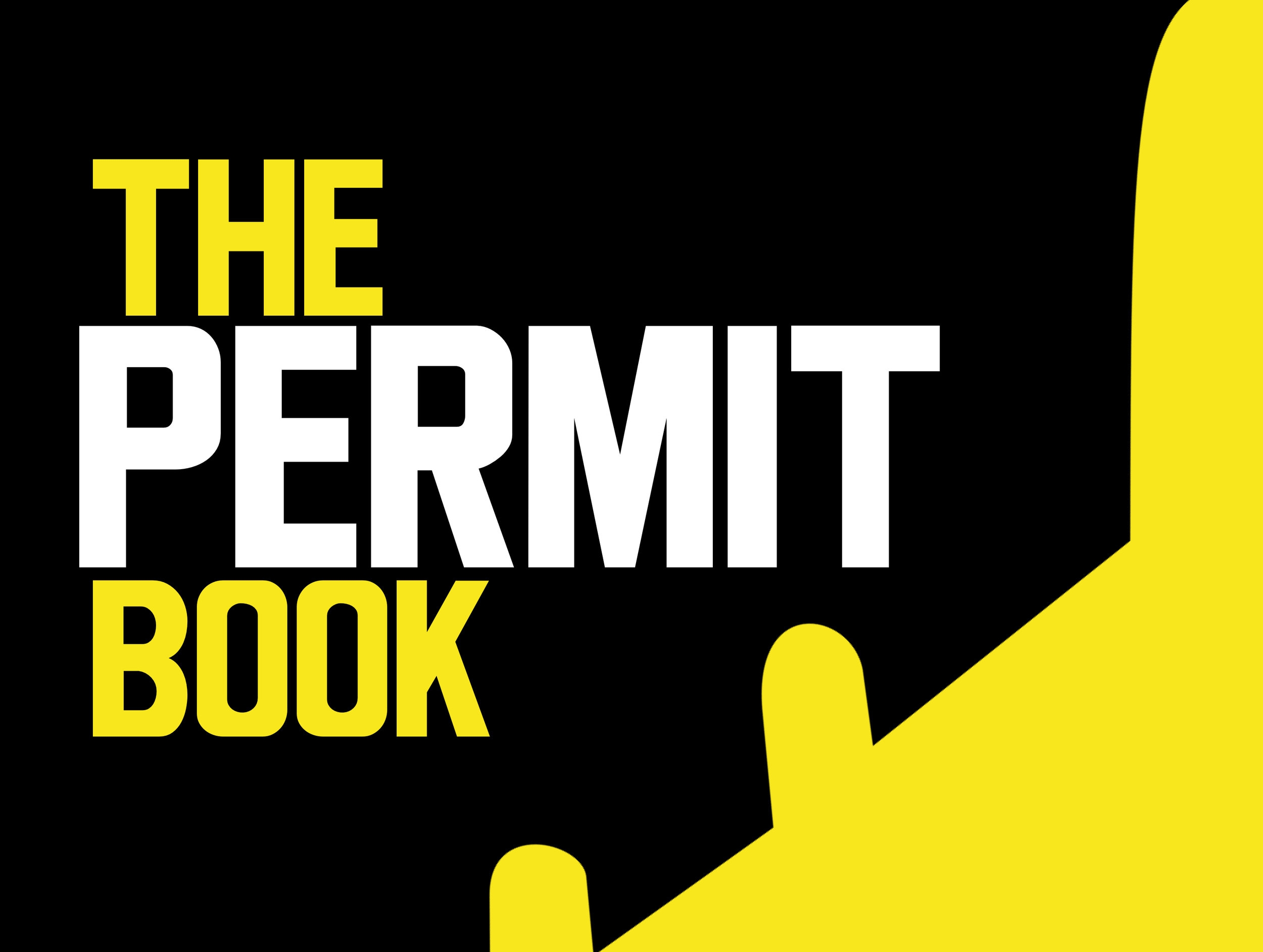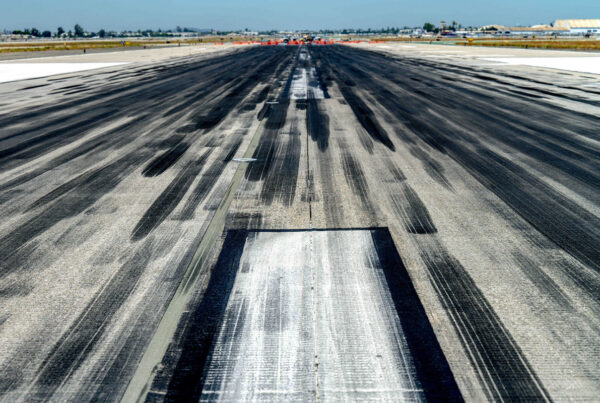Update 5 June 2019: All US private flights to Cuba are banned, under a new BIS rule. No Part 91 operations are allowed any longer.
Update 9 Nov 2017: Effective today, the US has new rules for travel to Cuba as an individual. These restrictions will limit the ability of US citizens to undertake most personal travel to Cuba unless part of a licensed group. The new measures will also bar US citizens and companies from engaging in business activities with over 180 Cuban enterprises the US government has concluded are linked to the Cuban government in some way (check the full list here). The new policy will not affect travellers with existing bookings, such as a flight or hotel reservations. Upon their return, all US citizens will be required to maintain proof of all activities in Cuba, and must ascertain that no U.S. laws were violated during their trip. OFAC and CBP will enforce the new regulations, much talk of hefty fines.
If you’re traveling to Cuba from anywhere other than U.S. territory, it should be a doddle. Get a landing permit, arrange your ground handling, file your flight plan, and off you go.
If you’re trying to get to Cuba from the U.S. though, it’s a different story…
A tale of two Presidents…
In December 2014, President Obama announced plans to improve relations between the U.S. and Cuba, and in the July of the following year a lot of restrictions were lifted for N-registered aircraft operators wanting to do private and charter flights to Cuba.
However, the U.S. authorities (the Treasury Department, in this case) didn’t want to break with tradition and make the process completely straight-forward and misery-free, so their Office of Foreign Asset Control (OFAC) introduced a rule which means that only 12 categories of travel are permitted between the US and Cuba. This was then further complicated by legislation introduced by President Trump in June 2017! Here are the permitted categories of travel:
(1) family visits
(2) official business of the U.S. government, foreign governments, and certain intergovernmental organisations
(3) journalistic activity
(4) professional research and professional meetings
(5) educational activities or so-called “people-to-people” travel – it’s not possible to claim this category if you make your own travel arrangements; this is only possible for officially sanctioned group travel.
(6) religious activities
(7) public performances, clinics, workshops, athletic and other competitions, and exhibitions
(8) support for the Cuban people
(9) humanitarian projects
(10) activities of private foundations or research or educational institutes
(11) exportation, importation, or transmission of information or information materials
(12) certain export transactions that may be considered for authorisation under existing regulations and guidelines.
As you might have spotted, you cannot simply travel from the U.S. to Cuba for the purpose of general tourism! You have to match one of these 12 categories.
Applying for a licence to travel
Here’s the thing: you don’t actually have to do this.
Once you decide which category applies to you, you do not need to apply for any kind of licence to travel from OFAC – you will simply qualify under their rules for the so-called ‘General Licence’.
However, each one of these 12 categories for permitted travel is highly controlled and has specific requirements that must be met for the exemption to apply. If you want help in trying to work out which one of these categories might apply to you, read the FAQ section of the official guidance – it’s actually pretty good: https://www.treasury.gov/resource-center/sanctions/Programs/Documents/cuba_faqs_new.pdf
Once you’ve done that, you might want to read the extra little FAQ they put together, following the changes made by President Trump in June 2017 (basically this just says that no more individual travel for educational or “people-to-people” will be allowed – only group travel will be allowed in this category): https://www.treasury.gov/resource-center/sanctions/Programs/Documents/cuba_faqs_20170725.pdf
I don’t match any of those 12 categories – what do I do?
If you do not match any of the categories, things get tricky. In this case you would need to apply to OFAC for a ‘Specific Licence’ – although this process can take up to 3 months. You can do this online at the US Treasury Dept page: https://www.treasury.gov/resource-center/sanctions/Pages/licensing.aspx
Should I book a trip myself, or book through a tour agent?
If you really are going to Cuba to visit relatives, or for some kind of religious pilgrimage, you could probably get away with making your own travel arrangements.
If not though, the easiest way to make sure you qualify will probably be to just engage the services of a U.S. based company to help make your travel arrangements – they’ll book you on to some kind of tour and get you to a sign a “travel affidavit” to confirm that you really are going to Cuba for the reason you say you are!
If you decide to make your own arrangements, you’ll still need to make sure you carry one of these documents. You don’t need to submit it anywhere in advance, but you do need to keep it handy just in case anyone from CBP asks to see it. To get a sample of this form, click here.
Bear in mind that if you book through a tour company, you will be traveling under a specific, government-approved itinerary. That means that when you get to Cuba, officially, you can’t just go wandering off by yourself. Your tour company won’t be able to book you into Cuban hotels, rent cars or take buses at all, since the Cuban government owns them. You’ll most likely be booked into a bed-and-breakfast, or a homestay, and you will only be able to take part in pre-approved, pre-arranged activities.
All this talk of OFAC and categories and travel affidavits is hurting my brain. Isn’t there an easier way?
Technically, yes there is.
If you want to avoid all this bureaucratic misery, you could always fly to Cuba by way of Mexico or Canada. There are no restrictions from those countries regarding travel to Cuba, so U.S. citizens can fly straight in. Remember, Cuba doesn’t restrict U.S. citizens from entering – just get a visa in advance, and that’s all you need.
However, bear in mind that when you return back to the U.S. – if you get caught out trying to hide your trip to Cuba from U.S. Customs officers, you could face serious punishment.
Cuba landing permit
You’ll need one, regardless of where you’re flying from, or what country your aircraft is registered in. The official notice required by the Cuban authorities to process a permit request is 3 working days. No docs are required to obtain an overflight permit, but for a landing permit, the following is required: CoR, CoA, CoI, crew and pax information, reason for flight and receiving party in Cuba for landing approval. Which brings us neatly on to…
Receiving party
Cuba will only give you a landing permit if you provide the name and contact details of a local receiving party or ‘business sponsor’. If you’re trying to do it yourself and do not yet have a local receiving party arranged in Cuba, you should contact your ground handler to check if they can act in this role for you.
Landing fees
There’s actually a very simple way to work these out:
![]()
Handling
The Cuban CAA require all operators to obtain handling confirmation from a company based in Cuba. If you don’t have a copy of an ‘Airworthiness Review Certificate’ for your aircraft (N-registered aircraft, for instance), you have to show a copy of aircraft maintenance log book entries showing the recent work performed on the aircraft and confirming that the aircraft was returned to service in an airworthy condition. Also, any jet over 10,000 LBS MTOW must provide a noise certificate via their handling company.
Visas
If you’re flying to Cuba from the U.S. you’re going to need to get proper business visas (remember, you’re not a tourist!). Although it is possible to obtain these on arrival in Cuba, reports suggest that it takes ages to process, so it’s probably best to get these in advance.
Insurance
Make sure that your aircraft insurance does not specifically exclude travel to Cuba – many do!
Foreign passengers
If you’re flying between the U.S. and Cuba with foreign nationals onboard – they are subject to the exact same rules as U.S. nationals in terms of meeting OFAC licensing requirements. The only exception is for Cuban citizens present in the United States in a non-immigrant status – they can travel to Cuba without having to tick any of those 12 OFAC boxes.
Time on the ground in Cuba
U.S.-registered aircraft are allowed remain in Cuba for up to seven consecutive nights. If you want to go for longer then you will need to get an export licence – that gets complicated.
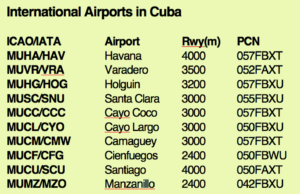
US Airports of Entry for your return flight
Recent policy changes mean that aircraft can now depart to Cuba from any customs designated airport in the U.S. (this applies to both U.S. and foreign-registered aircraft). However, when you return to the US, as you will be entering the from the south, you will need to land at the first designated airport of entry that is nearest to the point of crossing the U.S. border or coastline; if you want to land elsewhere you will need to get a Border Overflight Exemption.
Here is the list of southern airports of entry, from US Code of Federal Regulations 19 122.24
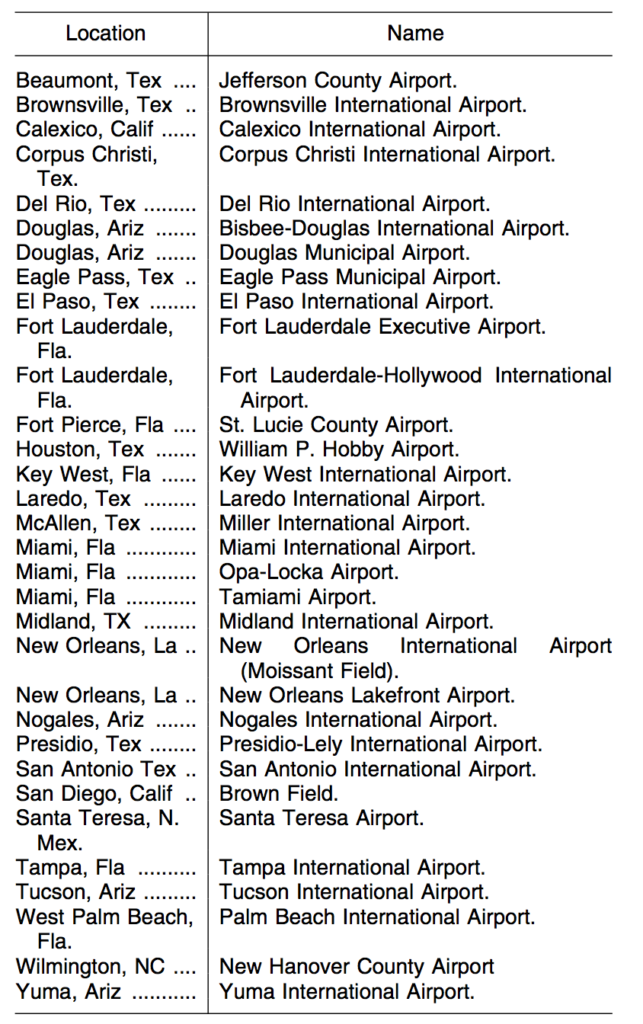
More information: There are a ton of reports on Cuba in Airport Spy, which is where all of us in OpsGroup tell each other about the airports we’ve been to – good ATC, bad handlers, rip-off fees… think of it as the TripAdvisor of airports. Also, if you want to know exactly how to get your Cuba landing permit, check out our Permit Book – this tells you how to get a permit for each and every country in the world!
More on the topic:
- More: Cuba Ops Guide: Why Most Private Jets Can’t Go
- More: Clarifying Cuba Overflight Permits and NAV Fees
- More: U.S. cracks down on scheduled flights to Cuba
- More: Total ban on US private flights to Cuba
- More: Matthew – Airports update 1400LT Wednesday
More reading:
- Latest: FAA Warns on Runway Length Data and Overrun Risk
- Latest: EASA’s New Cyber and Data Risk Rule for Operators in Europe
- Latest: Airport Spy: Real World Reports from Crews
- Safe Airspace: Risk Database
- Weekly Ops Bulletin: Subscribe
- Membership plans: Why join OPSGROUP?



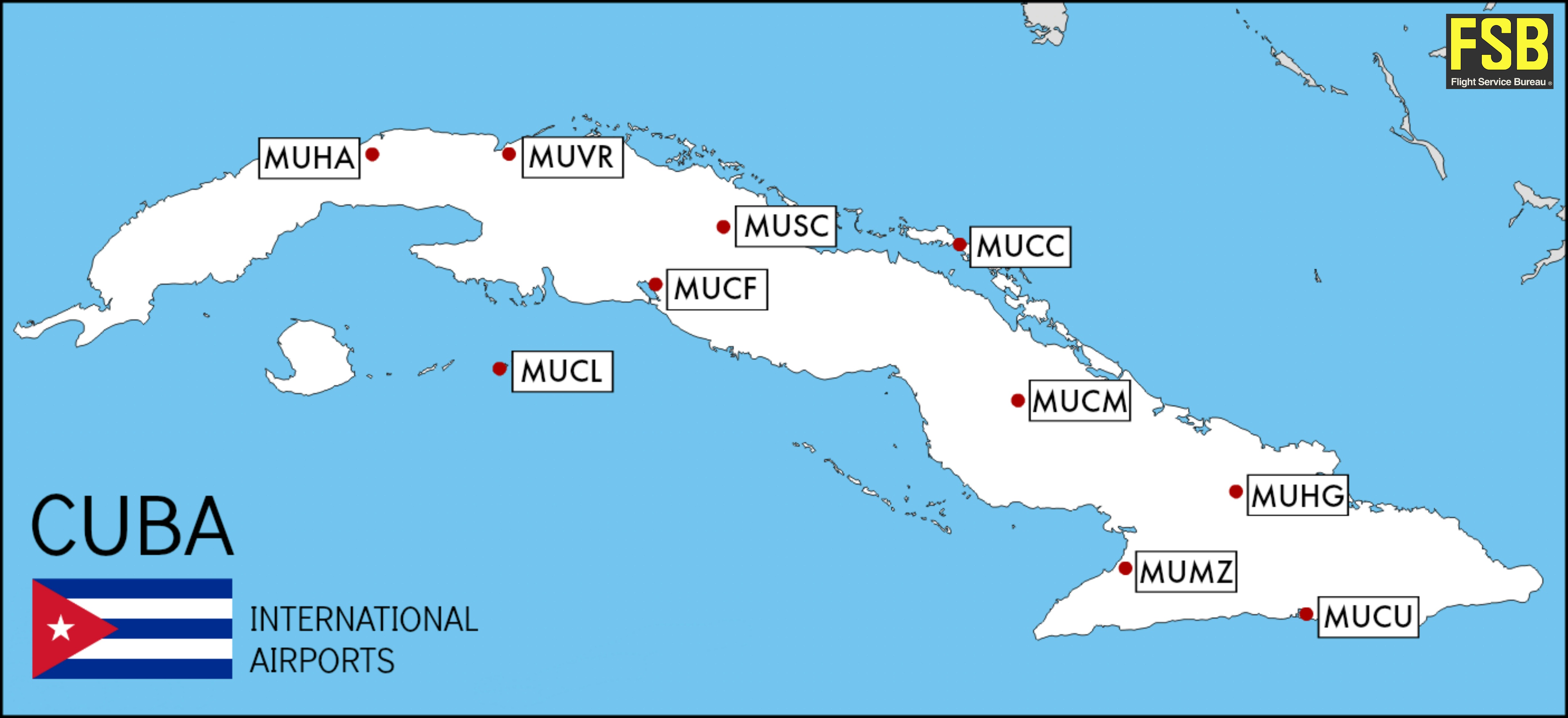





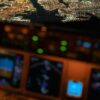

 Get the famous weekly
Get the famous weekly 